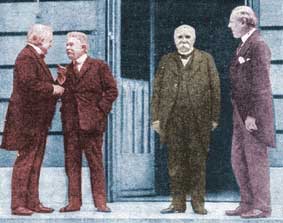45d. The Treaty of Versailles and the League of Nations

As the war drew to a close, Woodrow Wilson set forth his plan for a "just peace." Wilson believed that fundamental flaws in international relations created an unhealthy climate that led inexorably to the World War. His Fourteen Points outlined his vision for a safer world. Wilson called for an end to secret diplomacy, a reduction of armaments, and freedom of the seas. He claimed that reductions to trade barriers, fair adjustment of colonies, and respect for national self-determination would reduce economic and nationalist sentiments that lead to war. Finally, Wilson proposed an international organization comprising representatives of all the world's nations that would serve as a forum against allowing any conflict to escalate. Unfortunately, Wilson could not impose his world view on the victorious Allied Powers. When they met in Paris to hammer out the terms of the peace, the European leaders had other ideas.
The Paris Peace Conference
Most of the decisions made at the Paris Peace Conference were made by the Big Four, consisting of President Wilson, David Lloyd George of Great Britain, Georges Clemenceau of France, and Vittorio Orlando of Italy. The European leaders were not interested in a just peace. They were interested in retribution. Over Wilson's protests, they ignored the Fourteen Points one by one. Germany was to admit guilt for the war and pay unlimited reparations. The German military was reduced to a domestic police force and its territory was truncated to benefit the new nations of Eastern Europe. The territories of Alsace and Lorraine were restored to France. German colonies were handed in trusteeship to the victorious Allies. No provisions were made to end secret diplomacy or preserve freedom of the seas. Wilson did gain approval for his proposal for a League of Nations. Dismayed by the overall results, but hopeful that a strong League could prevent future wars, he returned to present the Treaty of Versailles to the Senate.
Defeating the League of Nations
Unfortunately for Wilson, he was met with stiff opposition. The Republican leader of the Senate, Henry Cabot Lodge, was very suspicious of Wilson and his treaty. Article X of the League of Nations required the United States to respect the territorial integrity of member states. Although there was no requirement compelling an American declaration of war, the United States might be bound to impose an economic embargo or to sever diplomatic relations. Lodge viewed the League as a supranational government that would limit the power of the American government from determining its own affairs. Others believed the League was the sort of entangling alliance the United States had avoided since George Washington's Farewell Address. Lodge sabotaged the League covenant by declaring the United States exempt from Article X. He attached reservations, or amendments, to the treaty to this effect. Wilson, bedridden from a debilitating stroke, was unable to accept these changes. He asked Senate Democrats to vote against the Treaty of Versailles unless the Lodge reservations were dropped. Neither side budged, and the treaty went down to defeat.
Why did the United States fail to ratify the Versailles Treaty and join the League of Nations? Personal enmity between Wilson and Lodge played a part. Wilson might have prudently invited a prominent Republican to accompany him to Paris to help ensure its later passage. Wilson's fading health eliminated the possibility of making a strong personal appeal on behalf of the treaty. Ethnic groups in the United States helped its defeat. German Americans felt their fatherland was being treated too harshly. Italian Americans felt more territory should have been awarded to Italy. Irish Americans criticized the treaty for failing to address the issue of Irish independence. Diehard American isolationists worried about a permanent global involvement. The stubborness of President Wilson led him to ask his own party to scuttle the treaty. The final results of all these factors had mammoth longterm consequences. Without the involvement of the world's newest superpower, the League of Nations was doomed to failure. Over the next two decades, the United States would sit on the sidelines as the unjust Treaty of Versailles and the ineffective League of Nations would set the stage for an even bloodier, more devastating clash.






